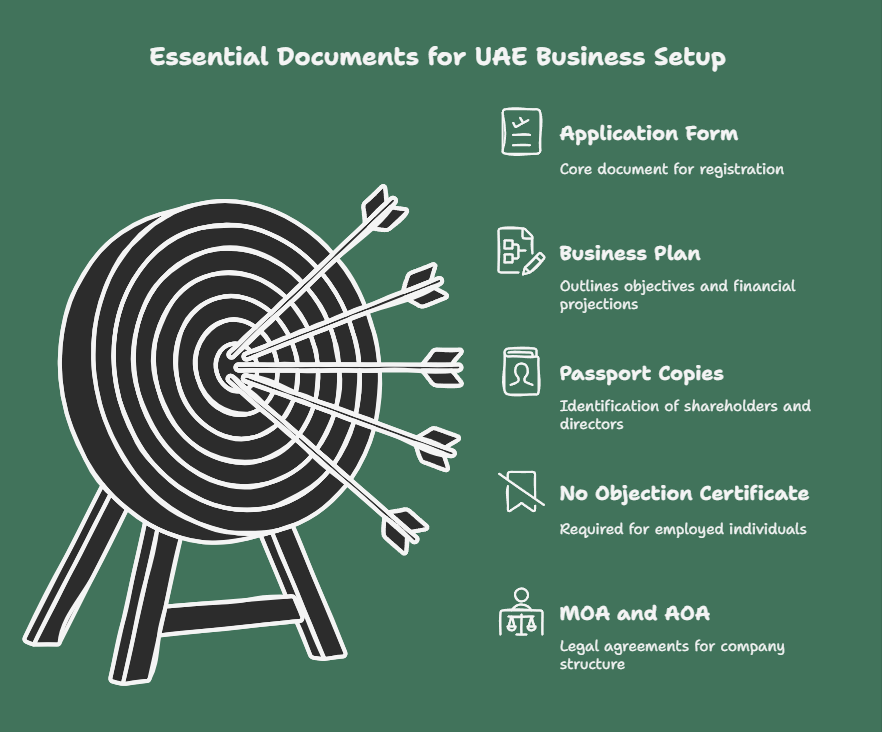The UAE is the most attractive location to start a business. Several reasons make it a unique choice. Ranging from its location and tax-free environment. Coupled with infrastructure, and business-friendly regulations. All these make it ideal to step on your new venture. Hence, the UAE offers unparalleled opportunities for entrepreneurs by getting business license.
UAE business setup requires understanding various processes. Along with legal structures, and associated costs. To know these, don’t skip this guide. The ultimate guide walks you through the:
- Steps for obtaining a UAE business license
- The factors that influence its cost, and
- The essential documents required for setting up a business.
By reading the guide, anyone can start a retail business, a consultancy firm, or an online enterprise. Ensure a smooth and successful launch while understanding these factors.
Factors Affecting the Cost of a Business License in the UAE
The cost of a business license in Dubai can vary. It is based on several factors. However, understanding these factors can help. You can better budget for the initial setup. This way, avoid unexpected costs. Here are the main variables that influence the cost of obtaining a business license:
| Factors | Description |
| Nature of the Business | The type of business plays a significant role in determining the license cost. Consultancy, retail, industrial, and e-commerce have different costs. Also, different industries may have additional requirements or approvals. This may affect the overall cost. |
| Business Location | Whether your business is set up in a free zone or on the mainland influences the cost. Free zones offer tax advantages and less stringent regulations but may come with specific license costs and restrictions. |
| Number of Partners | The number of partners involved in your business affects the licensing cost. Businesses with multiple partners may require additional agreements or documentation, which can increase the cost. |
| Office Space | Renting office space is a major part of the cost. Particularly if the company is set up in a prime location. Similarly, if the business is required to maintain physical office space. |
| Additional Approvals | Some businesses require additional approvals. Healthcare, education, or legal services are included. The approvals ca be taken from government departments or regulatory bodies. Ultimately, can add to the cost. |
How Much Does It Cost to Start a Small Business in the UAE?
UAE’s business license cost can range from AED 5,000 to AED 30,000. However, it depends on the:
- Type of business,
- Location, and
- Office space required.
The costs may be on the lower end of the spectrum if you are setting up a business in a free zone.
Free Zone Businesses:
Free zone business setup costs range from AED 5,500 to AED 20,000. Offer several benefits. These may include:
- Tax exemptions
- 100% foreign ownership, and
- Easy access to international markets.
These zones cater to specific business activities. They offer packages that include office space, visas, and a business license.
Mainland Businesses:
Typically, Business setup in the mainland requires more significant investment. Costs can range from AED 10,000 to AED 30,000. However, it depends on the:
- Business nature
- Office space, and
- Number of employees.
Mainland businesses require a local sponsor. Those who will own 51% of the company.
The business license cost is a main part of the budget. Other expenses include visa applications, office rent, and employee salaries. It may also contain any special requirements. Insurance or legal fees can be included.
Steps to Launch a Small Business in the UAE
To start a UAE business involves several key steps. Explore the essential steps to launch your business successfully. Here’s the outline:
1. Identify Your Business Activity
Defining your business activity is the first step. The UAE has a broad classification of business activities. Each requires a different type of license. For instance, the common types of business license UAE are:
Commercial License:
Retail, wholesale, and import/export businesses for trading activities.
Professional License:
Consultancy, IT services, and accounting firms for service-based businesses
Industrial License:
For manufacturing and industrial operations.
Tourism License:
For businesses in the hospitality and tourism sector.
2. Choose Your Business Location
Deciding the location is the next step. Whether establishing your business in a free zone or on the mainland.
Free Zones: These are dedicated areas. They are designed to promote specific industries. IT, finance, and manufacturing are a few examples. Free zones offer tax exemptions and benefits. The businesses can enjoy 100% foreign ownership. Free zone businesses are restricted to operating within that zone or internationally. They face limitations in doing business directly with the local market.
Mainland: Mainland business setup allows you to operate anywhere in the UAE. It requires a local sponsor a UAE national. One who holds 51% of the company. This offers greater flexibility. However, it comes with higher costs and more regulations.
3. Select a Legal Structure
The business legal structure will dictate the license type you need. Common legal structures in the UAE include:
Sole Proprietorship: A business owned and operated by one individual.
Partnership: A business owned by two or more people.
Limited Liability Company: The common business structure for small businesses in the UAE. It requires at least two shareholders and a local sponsor. Specifically for mainland businesses.
Free Zone Entity: A company set up in a designated free zone. Foreign ownership is allowed in most cases.
4. Register Your Company Name
A company name selection is an integral step in the business setup process. The name must comply with the UAE’s naming conventions. They avoid using offensive language. Don’t use religious references or abbreviations of existing company names. Proceed to notarize your Memorandum of Association and Articles of Association on name approval.
5. Obtain the Necessary Licenses
Apply for the relevant business license when your business structure and location are decided. For this, submit your application to the DED or the relevant authority. It depends on whether you are setting up in a free zone or mainland.
6. Apply for Visas
Applying for residency visas is essential for any employees who will be working in the UAE. You can apply for an employment visa for yourself and your employees. It may include dependents as well if applicable.
7. Rent Office Space
Office space is a main part of the business setup process. Most UAE businesses must have a physical office space. It can be in a free zone or mainland. The office rent cost varies significantly. It primarily depends on location and size.
Essential Documents for Business Setup
To start a UAE business requires submitting the following documents:
- Application Form: A completed application form for business registration.
- Business Plan: A detailed business plan. It outlines your business objectives, financial projections, and target audience.
- Passport Copies: Passport copies of all company shareholders and directors.
- No Objection Certificate: An NOC from your employer is needed. In case, you are currently employed in the UAE.
- MOA and AOA: Notarized Memorandum of Association and Articles of Association.
Additional documents may be required. However, it depends on the business nature. The proof of office space or specific permits for regulated industries are examples.
Online Business License in the UAE
For entrepreneurs looking to start an online business, the UAE offers special licenses tailored to e-commerce activities. Two popular licenses for online businesses are:
E-Trader License: For individuals who want to run an online business via social media platforms. This license is ideal for small-scale entrepreneurs. Those looking to sell products or services online.
E-Commerce License:
E-commerce websites and online stores do business with a more extensive online presence. This license allows you to conduct business across the UAE and internationally.
Benefits of Starting a Business in the UAE
Tax Benefits:
The UAE offers tax exemptions for businesses. This makes it a favorable destination for entrepreneurs.
Strategic Location:
Dubai’s location serves as a gateway between Europe, Asia, and Africa. This provides access to global markets.
Infrastructure:
The UAE boasts world-class infrastructure. It enhances business efficiency and connectivity.
Entrepreneurial Support:
The government has established several programs and services. The aim is to assist entrepreneurs with business setup and expansion.
Conclusion
Starting a UAE business offers tremendous opportunities for growth. You can streamline the process and set up your business smoothly. All you need is an understanding of the cost factors and required documents. Along with the steps involved in obtaining a business license. The choice is yours to choose between a free zone or a mainland location.
Before stepping on, a clear plan is essential. If you find it hard, partner with a local business setup consultant. They can help you navigate the regulatory landscape. Hire someone trustworthy like KPM PRO to build a successful business. Let’s step into one of the world’s most exciting markets!
FAQs:
What is a business license in the UAE?
In the UAE, a business license is your legal permit. Having it allows you to operate and conduct business activities within the country.
What are the main types of business licenses in the UAE?
The UAE offers four main types, including:
- Commercial
- Professional
- Industrial, and
- Tourism licenses
They’re based on your business activity.
What documents are required to obtain a business license in the UAE?
You’ll need a business plan, application form, passport copies, MOA, and AOA. Sometimes an NOC from your employer is also required.
What is the difference between a mainland and a free zone business license?
Mainland licenses let you trade anywhere in the UAE. Whereas free zone licenses focus on international or zone-based operations.
Who can help me obtain a business license in the UAE?
Business setup consultants like KPM PRO simplify the process. Their assistance handles documentation and guides you through every legal requirement.





